

Attitudes to biotechnology/GM. Planning for climate change. Role of plant breeding. Animal rights and livestock welfare. The future of farming > Friends of Europe > Friends of Europe. This background briefing for the Greening Europe Forum’s Autumn 2011 roundtable “The Future of Farming” focuses on two essential dimensions of the Commission’s recent reform proposals for a Common Agricultural Policy from 2014: ecological sustainability and social equality.

The authors believe the current round of reforms will be mainly a debate between the EU institutions and member states on the size and division of the CAP’s post-2013 budget, instead of a comprehensive new policy design reflecting the fundamentally different political and economic context of food and farming policy in the 21st century. This briefing consists of contributions from 3 independent think-tanks: Ecosocial Forum Europe, headed by former European Commissioner for Agriculture and Rural Development, Franz Fischler; the Institute for European Environmental Policy (IEEP); and Friends of Europe’s Greening Europe Forum.
New Agriculture Methods Could Halve Food Price Inflation - Outdoor - AccuWeather.com. Meet the UK's oldest farmers. 3 May 2012Last updated at 01:12 ET By Steven McKenzie BBC News Elwyn, Nancy and Ceredig Williams at their farm in Wales With changes to state and company pensions, the road to retirement is getting longer.
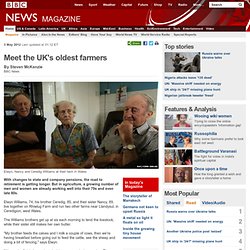
But in agriculture, a growing number of men and women are already working well into their 70s and even late 80s. Elwyn Williams, 74, his brother Ceredig, 85, and their sister Nancy, 89, live together on Rhiwlug Farm and run two other farms near Llandysul, in Ceredigion, west Wales. The Williams brothers get up at six each morning to tend the livestock, while their sister still makes her own butter. Media Centre: Countries adopt global guidelines on tenure of land, forests, fisheries. A female farmer in Uganda.
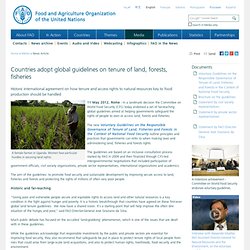
Women face particular hurdles in securing land rights. 11 May 2012, Rome - In a landmark decision the Committee on World Food Security (CFS) today endorsed a set of far-reaching global guidelines aimed at helping governments safeguard the rights of people to own or access land, forests and fisheries. The new Voluntary Guidelines on the Responsible Governance of Tenure of Land, Fisheries and Forests in the Context of National Food Security outline principles and practices that governments can refer to when making laws and administering land, fisheries and forests rights. The guidelines are based on an inclusive consultation process started by FAO in 2009 and then finalized through CFS-led intergovernmental negotiations that included participation of government officials, civil society organizations, private sector representatives, international organizations and academics.
The guidelines address a wide range of other issues as well, however, including: Government broadband plans face £1bn funding shortfall. 4 May 2012Last updated at 12:36 ET The government is targeting 90% superfast broadband coverage by 2015 A £1.1bn funding gap means the government's targets for broadband are unlikely to be met, says a report by the London School of Economics. The government wants 100% access to fast broadband services and 90% access to superfast services by 2015. The report says the government should do more to ensure that underinvestment does not harm the UK economy.
A rise in broadband penetration of 10% can lead to a 0.9%-1.5% boost in GDP per capita, the report adds. The cost of meeting the targets will be £2.4bn but funding for broadband from all public sources amounts to a total of £1.3bn, according to the LSE report, which was sponsored by customer management software company Convergys. VIDEO: Herefordshire farmers star in unique film - 2/20. "Who would be young and be a farmer?
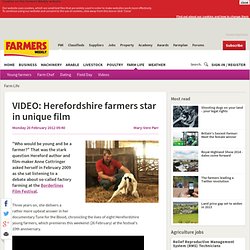
" That was the stark question Hereford author and film-maker Anne Cottringer asked herself in February 2009 as she sat listening to a debate about so-called factory farming at the Borderlines Film Festival. Three years on, she delivers a rather more upbeat answer in her documentary Tune for the Blood, chronicling the lives of eight Herefordshire young farmers, which premieres this weekend (26 February) at the festival's 10th anniversary. New Melbourne restaurant runs on your pee. Melbourne’s Greenhouse restaurant wants your patronage.
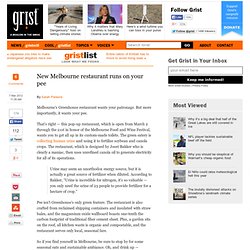
But more importantly, it wants your pee. That’s right — this pop-up restaurant, which is open from March 2 through the 21st in honor of the Melbourne Food and Wine Festival, wants you to get all up in its custom-made toilets. The green eatery is collecting human urine and using it to fertilize soybean and canola crops. The restaurant, which is designed by Joost Bakker who is clearly a maniac, then uses unrefined canola oil to generate electricity for all of its operations.
Urine may seem an unorthodox energy source, but it is actually a great source of fertilizer when diluted. Next Genus: Rural broadband firm runs out of cash. 15 March 2012Last updated at 13:01 ET Next Genus used both fibre and wireless to connect people to the net The rural broadband firm Next Genus has signalled that it is on the brink of collapse.

On its blog, the company announced that it had failed to find any "viable sources of finance" and would soon cease operations. The company tried to bring high-speed net services to rural areas by using local champions and private finance. Rival net firms have stepped in to keep customers connected in some areas, but others have effectively been cut off.
Local action. Food hubs: How small farmers get to market. New driverless tractor, grain cart systems coming this year. This is the year when autonomous vehicles will emerge from research and development tests to farmers’ fields.
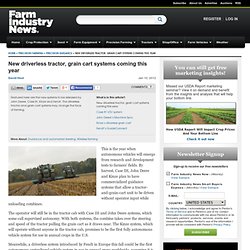
Future of farming: smaller power units, narrow implements. If you think the future of crop production means ever-wider equipment pulled by ever-bigger tractors, think again.
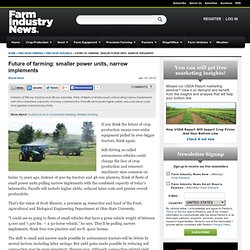
Self-driving so-called autonomous vehicles could change the face of crop production and resurrect machinery sizes common on farms 75 years ago. Instead of 500-hp tractors and 48-row planters, think of fleets of small power units pulling narrow implements with the combined capacity of today’s behemoths. Payoffs will include higher yields, reduced labor costs and greater overall productivity.